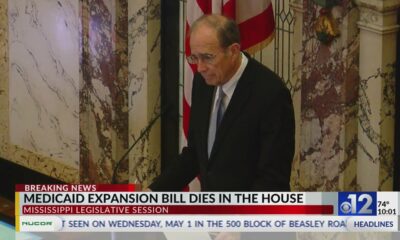Mississippi News
Medicaid expansion opponent proposes federal coverage for sick inmates
Republican legislators oppose Medicaid expansion, but want federal dollars to pay for prisoner healthcare
State Republicans have balked at expanding Medicaid, but are embracing legislation that would take advantage of the federal program to pay for healthcare for very sick incarcerated people — and likely create a money-making opportunity for nursing homes.
Senate Bill 2448, which passed the Senate with little opposition and is now with the House Medicaid Committee, would allow “medically frail” inmates to be paroled to “special care facilities.” These would be specially licensed nursing homes where Medicaid could help pay for their care.
Sponsor Sen. Brice Wiggins, R-Pascagoula, says his bill would reduce costs for the Mississippi Department of Corrections, which spends about $77 million annually on healthcare for people in its custody. Medicaid won't pay for healthcare provided inside jails and prisons, so the state pays the full cost of care for very sick and elderly incarcerated people. Currently, only a small number of Mississippians are granted medical parole every year, according to the Department of Corrections — just three were released in 2021.
When Mississippi Today asked for an estimate of the savings, Wiggins said he didn't have the number offhand but could get it later. He did not respond to subsequent phone calls and text messages.
Wiggins said he continues to oppose Medicaid expansion, which would save Mississippi an estimated net $200 million by 2027. He declined to explain why.
“I answered your question on the legislation, which is fair,” he said. “And then you jumped into Medicaid. I'm not discussing that.”
Last year, a similar bill passed the Senate and died in the House.
House Medicaid Committee Chair Rep. Joey Hood, R-Ackerman, did not respond to a request for comment.
Some prominent proponents of Medicaid expansion in Mississippi are skeptical of the bill.
“If what we're doing is offloading and giving parole to inmates so they can then get off the state's dime, and putting them on Medicaid, when we're not allowing working Mississippians who pay taxes to have the same benefit of healthcare coverage as these inmates who have committed crimes against society, who haven't paid taxes in years, that's just wrong,” said Richard Roberson, vice president of state policy for the Mississippi Hospital Association.
To Roberson, the politics around SB 2448 are puzzling.
“Any time you see something unusual from the Capitol that seems a little out of sorts like this one does, where you have Republicans passing a bill to expand Medicaid to inmates, that seems inconsistent with the ‘no to Obamacare,' ‘no to Medicaid expansion,'” he said. “That typically tells me that there's something under the surface somewhere.”
Senate Bill 2448 defines “medically frail” inmates as those who are “a minimal threat to society” because of their medical condition, who can't perform daily living activities on their own, and who may have limited mobility because of their condition. Sex offenders and people on death row would not be eligible.
MDOC does not currently use the term “medically frail” to categorize incarcerated people, so the Department could not immediately say how many people might be eligible for parole if SB 2448 became law.
If the bill were to pass, people could be paroled to “special care facilities” that offer services like other nursing homes, including recreation and spiritual activities as well as medical care.
“It reduces the cost to the state,” Wiggins said. “It places these inmates in a place to receive medical treatment. And it's a win-win all around.”
One additional potential winner of the legislation: nursing facilities. By getting licensed as “special care facilities,” they could welcome new patients with guaranteed funding.
Wiggins said a number of facilities around the state are interested in becoming licensed for the purpose, though he did not say which ones.
In 2013, Connecticut became the first state to contract with a nursing facility to house people paroled from prisons with serious medical needs. The facility, 60 West, now houses about 40 people paroled from prison, out of a total of about 85 residents. Other residents are considered “hard to place” for other reasons, such as prior criminal history or registered sex offender status.
David Skoczulek, vice president of business development at iCare Health Network, which operates 60 West, said the facility is “a financially viable model” — that is, profitable for the operator.
Skoczulek said he was vaguely familiar with the Mississippi proposal because a year or two ago, his company was contacted by someone in Mississippi who wanted to pursue a similar project. He didn't remember the specifics, but said the Mississippian had an existing property in mind and wanted advice from iCare on turning it into a facility that could care for paroled prisoners, or possibly to pursue a joint venture.
“They were interested in getting it pushed along in the legislature,” Skoczulek said.
Other states have also followed Connecticut's example in expanding medical parole to send inmates to nursing homes. That's the model Wiggins' bill would emulate.
Skoczulek said iCare frequently provides information and advice to people in other states seeking to replicate the success of 60 West. The company also operates a similar facility in Massachusetts.
The Mississippi Health Care Association, the state's largest organization of nursing homes, has not taken a position on the bill. The organization declined to comment for the story.
The Mississippi State Department of Health, which would be responsible for licensing the special care facilities, said it had not been contacted by any interested facilities. The agency also said it had not seen an analysis of the bill's costs and savings.
After the 1970s, tough-on-crime policies and harsh mandatory minimum sentencing laws led to an explosion in the number of incarcerated Americans. Now, those policies mean more people are growing old in prison.
According to a 2012 ACLU report, the number of incarcerated Americans over age 55 quadrupled from 1995 to 2010. By 2030, they could comprise a third of all prisoners. Providing healthcare for an older, sicker prisoner is expensive: In North Carolina, officials estimated the average cost of caring for someone over age 55 was four times that of someone under 55.
Mississippi currently incarcerates 507 people aged 65 or older, according to MDOC.
To save money, some states have expanded compassionate release policies to send people home, where Medicaid and Medicare can help pay for all of their care.
Mississippi also has a compassionate release policy. People who are 60 years or older or have a severe medical condition with no chance of recovery– a condition that is “incapacitating, totally disabling, and/or terminal in nature”– can qualify for early release.
But as in many states, Mississippi's policy is little used. According to MDOC, 10 people were granted parole under the policy in 2019, followed by seven in 2020 and only three last year.
If saving money for the state's prison system is the goal, there's another measure that experts say would be even more effective: expanding Medicaid eligibility for all Mississippians.
In states that have expanded Medicaid coverage, incarcerated people are nearly always eligible because of their limited incomes. Medicaid won't pay for healthcare provided inside jails and prisons, but it can reimburse states for care that takes place off-site and requires at least a 24-hour stay in a hospital or nursing facility.
If a healthy 35-year-old incarcerated in Kentucky gets appendicitis and requires a two-day hospital stay, for example, Medicaid can help pay for his care. That saved the state $16.4 million in 2014 and 2015, according to the Pew Charitable Trust.
In Mississippi, the state picks up the entire tab. MDOC spent $24 million on off-site care in fiscal year 2020.
Dan Mistak, acting president and director of Health Care Initiatives for Justice-Involved Populations at the non-profit Community Oriented Correctional Health Services, said SB 2448 would likely affect only a small number of incarcerated people, limiting the potential savings for Mississippi.
Not only would broader Medicaid expansion allow MDOC to get reimbursed by for a greater share of medical expenses, it could also help reduce the number of people who wind up in the criminal justice system, Mistak said. Expanding access to mental and behavioral health care and substance use treatment programs could mean fewer people sent to jails and prisons.
“What this legislator seems to be trying to do is patch this up at the very end of this, at the most expensive side, rather than go upstream and say how do we improve people's health, and keep them out of prisons,” Mistak said.
Some states have found that paroling incarcerated people to nursing homes is not as simple as passing a law. In Colorado, officials have struggled to find nursing homes willing to accept medical parolees because of their criminal records.
And initially, Medicaid refused to reimburse Connecticut for parolees' care at 60 West, citing the fact that some residents lived in a secure unit with no medical justification. But the federal government later certified 60 West for reimbursement.
If a facility resembles a prison, Medicaid won't pay for a person's care there.
“If I had you tour both nursing homes right now and didn't tell you what the mission was, you would have no idea you were in anything other than a standard nursing home,” Skoczulek said. “There are no guards, no gates, no shackles, no lights out, no any of that stuff… We have to preserve resident rights.”
Wiggins, a former prosecutor, told Mississippi Today paroling “convicted felons” to medical facilities was better than paroling them to their homes to be with their families.
“They gotta serve their time,” he said. “And they would be considered an inmate.”
This article first appeared on Mississippi Today and is republished here under a Creative Commons license.
Mississippi News
On/off weekend rain
SUMMARY: The weather in Columbus, Mississippi is expected to have scattered showers and thunderstorms over the weekend. Temperatures will be in the low to middle 60s at night and low to middle 80s during the day. There is a chance of showers during the Starkville Derby weenie dog race, with cloudy conditions and breaks of sun. Temperatures will continue to rise into the upper 80s and potentially lower 90s next week with on and off rain. Overnight lows will remain mild in the low 60s to low 70s. Stay prepared for rain with rain gear as showers and storms are expected.
The post On/off weekend rain appeared first on www.wcbi.com
Mississippi News
Jackson pastor concerned about sinkhole near bridge
SUMMARY: The pastor of Cornerstone Missionary Baptist Church in Jackson is calling for the condemnation of a bridge on Martin Luther King Boulevard near his church due to safety concerns. The bridge has been a problem for nearly a decade, with a large sinkhole recently appearing. The pastor is advocating for the city to take action, as the bridge has already been the site of a fatal accident and lacks guardrails. While repairs are being made, the pastor believes the street should be shut down to prevent further accidents. The City of Jackson has not responded to inquiries about the issue.
The post Jackson pastor concerned about sinkhole near bridge appeared first on www.wjtv.com
Mississippi News
Shopping trips ends with shoplifting charges for Lee County women
SUMMARY: Two Lee County women, Marie Thomas and Brandy Allred, were arrested in Tupelo for a substantial shoplifting case where they took over $1,000 worth of merchandise. Thomas was charged with felony shoplifting and her bond was set at $5,000, while Allred was also identified as a suspect in two grand larceny cases and was charged with felony shoplifting and two counts of grand larceny, with a bond set at $50,000. The incident occurred in February at a business on South Green Street in Tupelo. Follow WCBI on Facebook for continuous news updates.
The post Shopping trips ends with shoplifting charges for Lee County women appeared first on www.wcbi.com
-
Mississippi Today6 days ago
On this day in 1951
-
SuperTalk FM1 day ago
Driver’s education set to become mandatory in Mississippi as bill passes
-
SuperTalk FM4 days ago
Festival merger in Leland sets up one major event for Mississippi Delta
-
Mississippi News7 days ago
One injured in Mississippi officer-involved shooting after chase
-
SuperTalk FM5 days ago
PERS bill set to phase in employer rate increase heads to governor’s desk
-
Mississippi Business3 days ago
Geartek expanding operations in Alcorn County
-
Mississippi News3 days ago
Two women accused of shoplifting across southeast captured in Mississippi
-
Mississippi News2 days ago
Altercation at Mississippi police department leads to officer-involved shooting










































